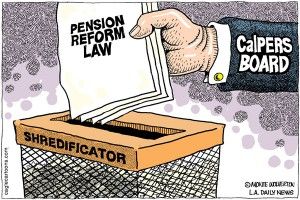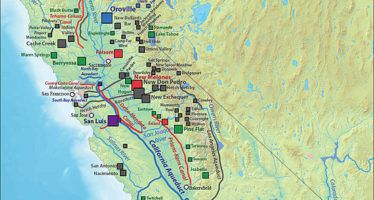Retirement will be painful for most

 In an excellent column in the U-T San Diego, Dan McSwain paints a grim retirement picture for almost everybody:
In an excellent column in the U-T San Diego, Dan McSwain paints a grim retirement picture for almost everybody:
For most Americans, it’s tempting to live in denial or outright fantasyland when it comes to paying for retirement.
That’s because doing the math evokes less-pleasant emotions like fear, anger or hopelessness.
Social Security, which replaces just 40 percent of the average earner’s paycheck upon retirement, is running out of money. The median household savings rate is zero. And half of workers have no pension or 401(k) account.
There’s just no way around the math. As a group, Americans have three choices: Spend less, work longer, or accept being poorer in retirement.
He’s not talking, yet, of government pensions, but what the rest of us will have to put up with. Years of slow or no economic growth, combined with the retirement of the massive Baby Boom generation — which didn’t have enough kids to replace itself — make all the actuarial tables look bad.
Combine that with the Federal Reserve Board keeping interest rates at zero percent (so federal debt is cheap; and money is forced into stocks), meaning it’s pointless to save in a bank passbook account as most people used to — and you have the makings of retirement disaster.
Public pensions
Then there are the government-worker pensions:
Yet this dire tableau is worse than it looks, because most public pensions are in the same shape as the average worker — under-saved and overcommitted.
The difference is that pensions are guaranteed by taxpayers under California’s constitution (and those of 11 other states).
Thus a poverty spiral looms: As workers fail to stash enough cash for their own retirements, they face growing claims on income from local governments.
To see how this works, consider the plight of a San Diego household.
Officially, the pension system for city workers and retirees was underfunded by $1.54 billion as of June 30, while the county’s unfunded liability was $2.32 billion.
When you carve out city residents’ share of the county total, this combined shortfall equates to $5,400 per household.
Paycheck deductions from public workers will help, but the bulk of this responsibility falls on taxpayers.
Right. As outgoing San Jose Mayor Chuck Reed has quipped, eventually the pension payments will loom so large that all current city employees will be cut in his city but one: a person who sends out the pension checks.
BK
I think, eventually, this situation will reach a boiling point. The services will be cut so much, and taxes raised so high, people just won’t take it.
So far bankrupt cities have worked out pension deals with CalPERS to keep the contributions going — with the cuts coming to city services. But that can’t last forever. Indeed, Vallejo, which went BK in 2008, already is at risk again for another BK because of its “pricey pensions.”
Whether the state constitution says the pensions must be paid, or not, eventually there will be no money to pay them in full.
Related Articles
CalWatchdog predicted CEQA arena exemption
April 26, 2013 By Katy Grimes This is one of those “I told ya so” moments. On March 30 I contacted
No cussing? Hell yeah!
As if we needed more evidence as to why the latest Field Poll shows a scant 16 percent approval rating for
Water bill in Congress ‘puts families before fish’
A bill to address California’s drought and future water supply in the House of Representatives has Gov. Jerry Brown angry.



